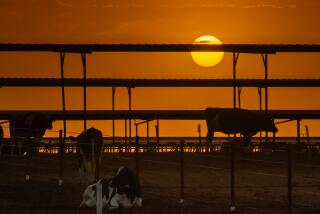Field Goal: Get Them Back Into Shape
- Share via
With flood waters receding in Northern and Central California, grim-faced farmers are getting a better feel for the degree of woe that awaits them.
In Butte County, rice straw by the ton has been carried downstream by the surging waters. The state’s phase-out of the burning of rice straw, intended to reduce air pollution, leaves growers with few options.
“Two years ago in the heavy flooding, I saw fields with 5 feet of straw that didn’t dry till July or August,” said Randall “Cass” Mutters, Butte County farm advisor with the University of California cooperative extension. He said chances are that some fields won’t dry out this year and thus won’t be planted come summer. The wayward rice straw is also clogging drainage ditches, exacerbating the problems.
Farmers will have to re-level rice and row crop fields, filling in channels and removing everything from tree stumps to old washing machines. Mutters figures it will cost upward of $500 an acre to get some of the land back in shape for planting.
*
Elsewhere, concerns turn to dairy farmers and cattle ranchers, many of whom lost not only animals but also tons of stored feed and forage that were just sprouting in the fields.
“This crop is history,” said Marsha Campbell Mathews, farm advisor in Stanislaus County. “Cows don’t eat walnuts.”
Thousands of dairy cows have been stressed by the high waters or by being moved to higher ground, and thus might not produce milk for months to come.
“A lot had to be swum out,” Campbell Mathews said. “And cows don’t like changes in routine.” Campbell Mathews, a white-water canoeist, said she “wouldn’t have wanted to run the waves” moving through some of the dairies near the swollen Tuolumne River.
Dairymen, she said, have pitched in to help one another--taking in cows and helping with milking.
In Ferndale in Humboldt County, dairyman Dennis Leonardi, owner of Evening Star Holsteins, said the floods swamped 80% of his silage ground. Leonardi now expects to pay dearly for feed that he otherwise would have grown for his operation, and he plans to thin out his herd to save on costs. His hope is that milk prices remain strong.
Hammered in three previous floods, Leonardi built his milking parlor “way high,” and it survived in fine shape. But the 300 acres of surrounding land and many fences are a shambles.
Loan Rangers
Glendale Federal Bank, which has made great sport of Wells Fargo’s takeover of First Interstate Bank, is invading more turf that has been the province of bigger guns such as Wells, Bank of America and Sanwa: lending to Central Valley farmers and food processors. “We are a community bank, and we felt to be really competitive in the Central Valley we had to be involved in ag lending,” said Terry Hess, executive vice president and director of business banking at Glenfed. With a boost from Glenfed’s recent purchase of Home Savings’ $70-million portfolio of agricultural loan commitments, Hess expects Glenfed’s ag position to surge to more than $100 million by late June. Its new offices--in Bakersfield, Fresno and Visalia--will specialize in crop production loans.
(BEGIN TEXT OF INFOBOX / INFOGRAPHIC)
Save the Cows
The floods of 1997 have wrecked havoc at some Northern and Central California dairies. A preliminary look at some of the consequences:
Farmers in areas unaffected by the recent storms are helping those in flooded regions evacuate and proved shelter for dairy cows.
Along the Tuolumne River in Stanislaus County, 15-dairies with more than 8,000 cows have been evacuated.
Dairies bordering the San Joaquin River in Stanislaus and Merced counties have transported more then 10,000 to safety.
In rural areas of Manteca in southwest San Joaquin County, 6,500 dairy cows are being evacuated.
As levees continue to crest, these numbers will increase significantly.
Source: California Milk Advisory Board
*
Martha Groves can be reached by e-mail at martha.groves@latimes.com or by fax at (213) 237-7837.
Friday: Aerospace
More to Read
Sign up for Essential California
The most important California stories and recommendations in your inbox every morning.
You may occasionally receive promotional content from the Los Angeles Times.














